Devialet Dione review: soundbar sophistication
Devialet's first soundbar, Dione, is a high-end all-in-one, but is it worth its considerable outlay? Here's our review...

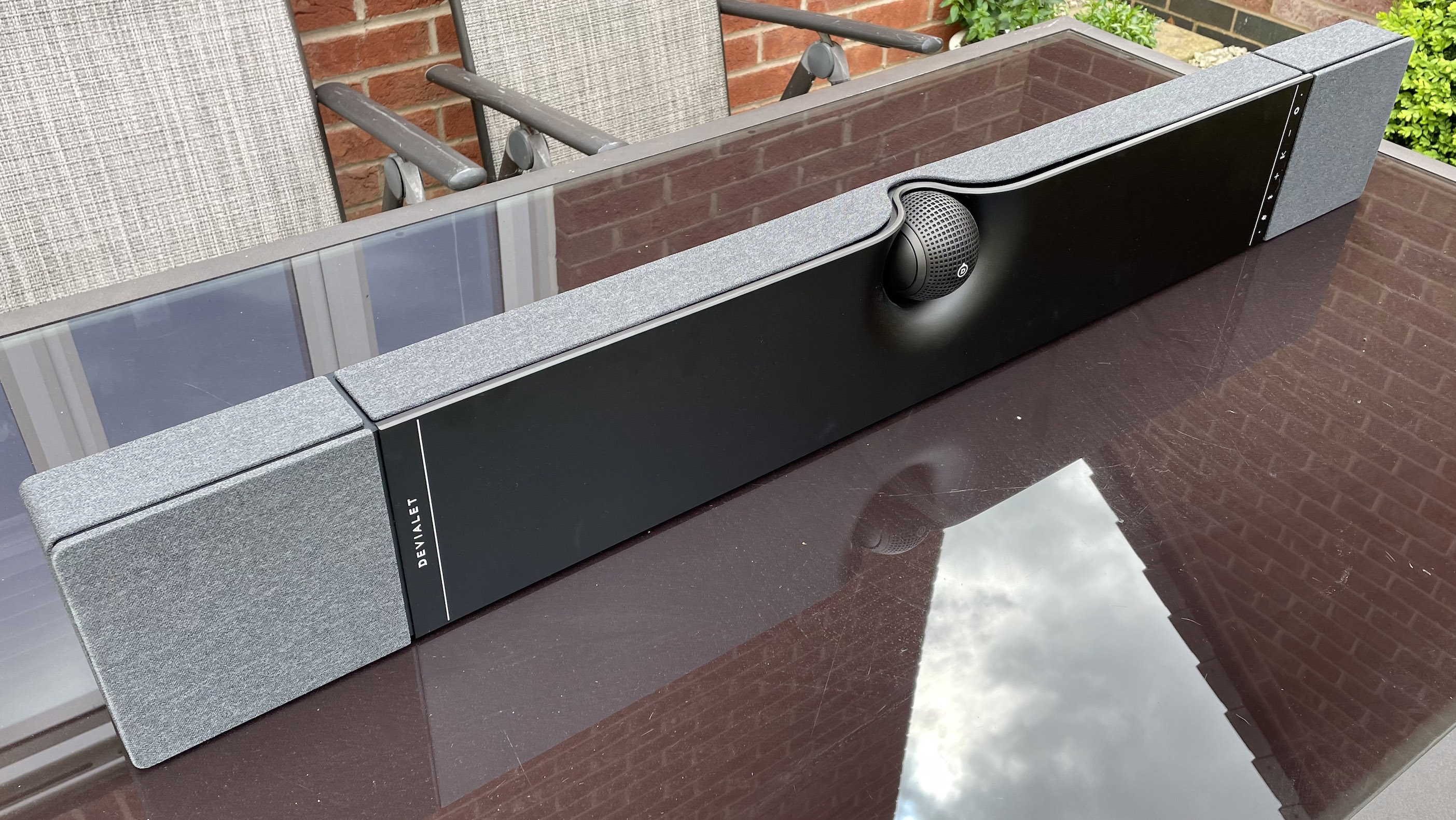
With its striking combination of form, function and good old-fashioned power, the Dione propels Devialet onto the soundbar A-list at the first time of asking. It'll cost you a pretty penny and there are more immersive alternatives, but from a quality perspective this all-in-one solution is a sophisticated soundbar option.
-
+
Stylish but also practical design
-
+
Excellent sound quality
-
+
Unique support for both desktop and wall-mounted installation
-
-
No real surround sound action
-
-
Premium pricing
-
-
Bass needs volume to shine
Why you can trust T3

French brand Devialet has become renowned since its launch in 2007 for creating uniquely and innovatively designed audio products that also happen to sound seriously good. A reputation which, we’re happy to say, continues with the brand’s first soundbar: the Devialet Dione.
Tucked away inside the Devialet Dione’s reasonably compact form are enough channels, overall power, and detailing to ensure that its claims of Dolby Atmos object-based decoding support are much more than just optimistic marketing, while the brand’s reputation for thinking out of the box continues in the unexpected shape of a spherical centre channel that can be physically rotated around to suit different installations.
Devialet Dione: Price and availability
The level of innovation, power and flexibility delivered by the Devialet Dione doesn’t come cheap. Its £1,990/$2,300/AU$3,990 asking price puts it comfortably in the premium tier of the soundbar market typically reserved for high-end hi-fi brands. That's about 25 percent more pricey than even the 11.1.4-channel Samsung HW-Q990B, which adds physical rear and subwoofer speakers to its main soundbar.
Getting hold of a Devialet Dione is also for the reserve of more audio-focused specialist stores, or you can buy from Devialet directly on its website where, at the time of writing, there's plenty of stock available.
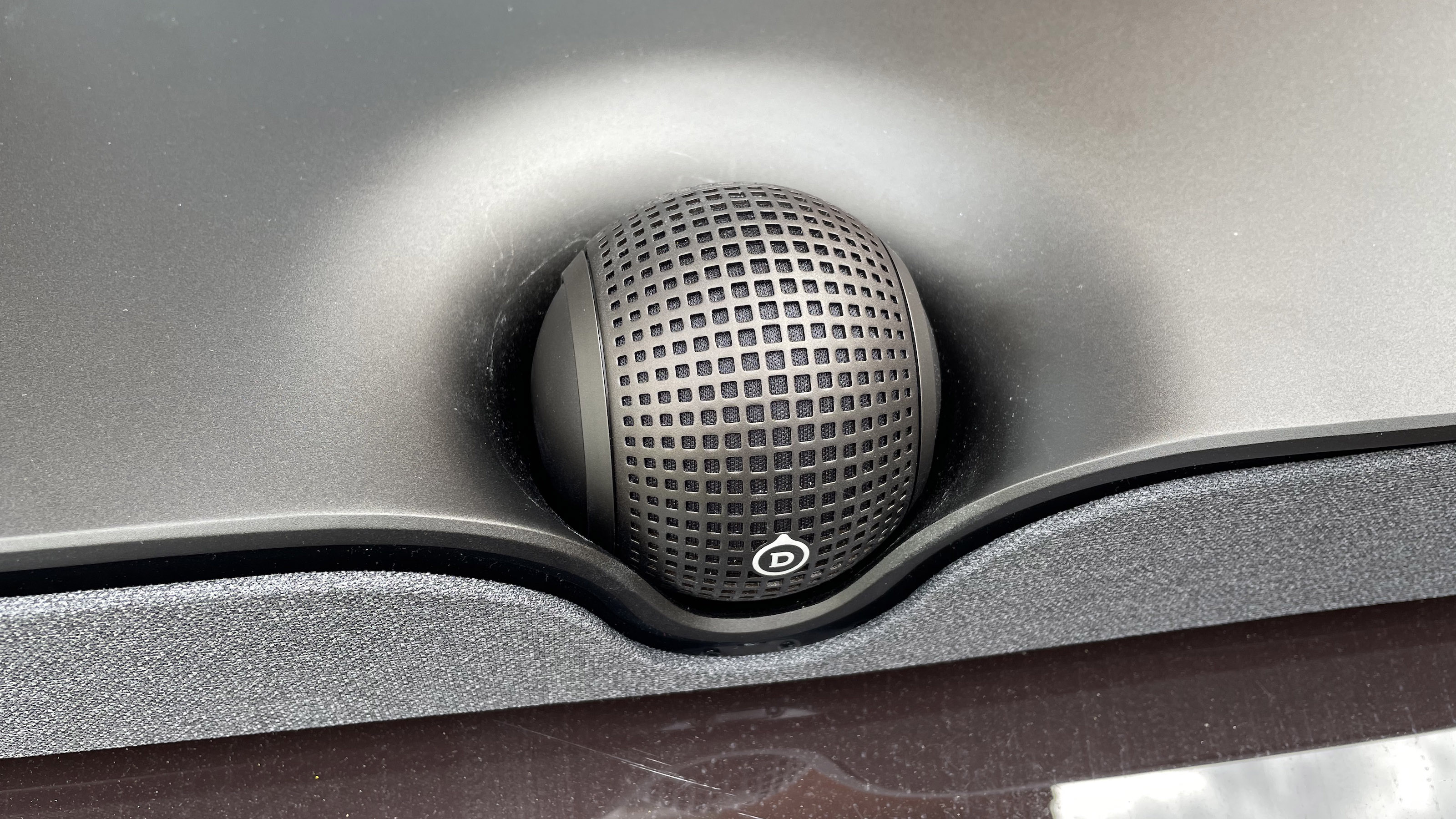
Devialet Dione: Design and features
You don’t have to dig too deep, though, to start to understand how Devialet might go about justifying the Dione’s price. For starters it looks truly unique. The spherical centre speaker sitting pretty at the top-centre of the front edge is enough in itself to grab your attention, but the way Devialet’s designers and audio engineers have gracefully integrated the sphere into a smooth ‘pit’ on the top edge merely emphasises its unique elegance.
Tucked inside its heavy, beautifully constructed body are no less than 17 different drivers, serving up 950W of sound across a 5.1.2 channel configuration (that's five front channels, one bass centre, and two upfiring channels). Nine of the drivers are full-range aluminium affairs, while the other eight are aluminium long-throw subwoofers designed to make you forget about the lack of an external subwoofer.
A big question for any one-box soundbar that doesn’t ship with an external subwoofer is the level of bass it can deliver. Devialet claims, though, that the Dione can get as low as 24Hz which, if that level of rumble actually manages to escape from the compact bodywork successfully, would potentially make the lack of an external subwoofer no issue at all.
The coolest thing about the Dione has to be its ‘Orb’ centre speaker. As its name suggests, this boasts a spherical shape – partly to enhance the scale and dispersion characteristics of centre channel information, partly to enable the soundbar to be more effectively switched between desktop and wall-mounting positions.
Placed flat on a table in front of your TV, the Orb sits towards the front of the soundbar with a little encircled D logo at the front helping to indicate the sound is coming out in the correct forward direction. Hang the Dione on the wall under your TV (a wall-mount kit and template are included in the package) and the Orb can be rotated around so that it still focuses dialogue in the correct orientation even though what was the bottom edge of the Dione in the desktop configuration is now hanging vertically against the wall.
In this wall-hung setup the speakers that were previously forward firing now become the up-firing Atmos height channel drivers, while the up-firers become the front left and rights. The rear left and right speakers continue in the same role, but their left and right output is reversed. This is all seriously clever stuff, made even neater by the inclusion of a gyroscope so that the soundbar automatically knows which way round it is being used.
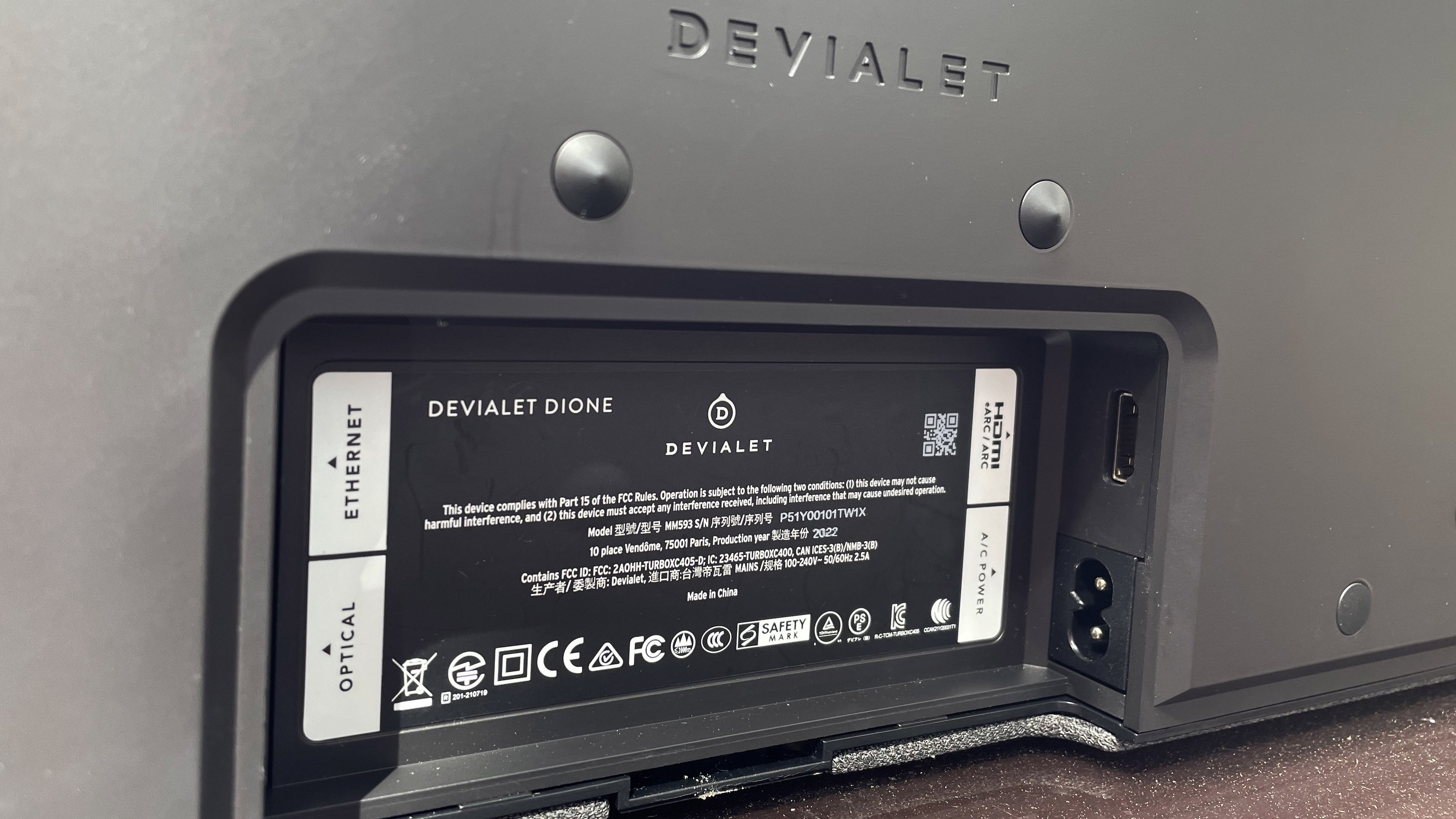
At this point there are a couple of disappointments to report for a soundbar that costs so much. First there’s no included remote control. You can only control it via the Devialet app or the HDMI CEC system. Unless, that is, you cough up extra for Devialet’s Phantom Remote. To be fair, the app works perfectly well, but sometimes nothing beats the instant convenience of a dedicated handset.
The other limitation is that there’s no HDMI loop-through support. The only way to get Dolby Atmos into the soundbar is via the eARC/ARC capabilities of the Dione’s single HDMI port. This is hardly the end of the world, of course, given that eARC can pass lossless Dolby Atmos sound from an eARC-equipped TV. It’s also true that sticking with ARC/eARC avoids the issue all soundbars with HDMI loop-throughs have when it comes to being able to pass through things like Dolby Vision and HDR10+ high dynamic range, plus the latest 4K/120Hz and variable refresh rate (VRR) abilities of the latest game consoles and PCs.
Not providing HDMI loop-through does, though, shift the onus of Dolby Atmos support to a secondary device (your TV) – and not all TVs support the ‘e’ version of ARC required for truly lossless Dolby Atmos sound output. Or, even, the ability to pass Dolby Atmos through their electronics.
Also, long experience has shown that eARC and ARC can cause frustrating audio sync issues. During our tests of the Dione, for instance, we found that with a Samsung 75Q950A TV we had to make sure that we’d turned the Digital Output Audio Format feature in the TV’s menus to passthrough rather than the Auto to avoid lip synch errors with the soundbar. Also, with native True HD Dolby Atmos playback from an Oppo 205 4K Blu-ray player, we had to set the Oppo player’s audio delay adjustment to -60 before the sound and vision seemed to sync properly. And not all 4K Blu-ray players permit negative as well as positive adjustments to digital sound output.
In reality most people will be able to work around potential ARC audio sync issues in one way or another, but providing an HDMI loop-through would have avoided some potential hassle.
Connections the Dione does provide beyond the single HDMI comprise an optical audio input and an Ethernet port, as well as Bluetooth 5.0 and dual-band 802.11/5Ghz Wi-Fi wireless options. The wireless connections include support for AirPlay 2 and Spotify Connect too.
The Dione carries four microphones to assist with its effective room calibration system, and can be used as part of a multiroom setup with Devialet’s Phantom speakers via Airplay 2.
The Dione’s digital to analogue converter is one of Devialet’s own ‘intelligence’ 24bit/96kHz processors and provides a number of different audio presets for non-Atmos sources, including Movie and Spatial modes that use Devialet’s proprietary Space Technology to upscale any mono or stereo signal into a 5.1.2 signal. There’s a Voice mode, too, for making dialogue stand out more clearly, and a music mode if you’d rather stick with traditional stereo playback.
One final feature absentee worth mentioning is support for DTS:X playback. Hardly any TVs support passthrough of DTS:X soundtracks via eARC anyway, to be fair. But if you do find a way to get DTS:X into the Dione, it will convert the signals to PCM and then run the results through its Space processor.
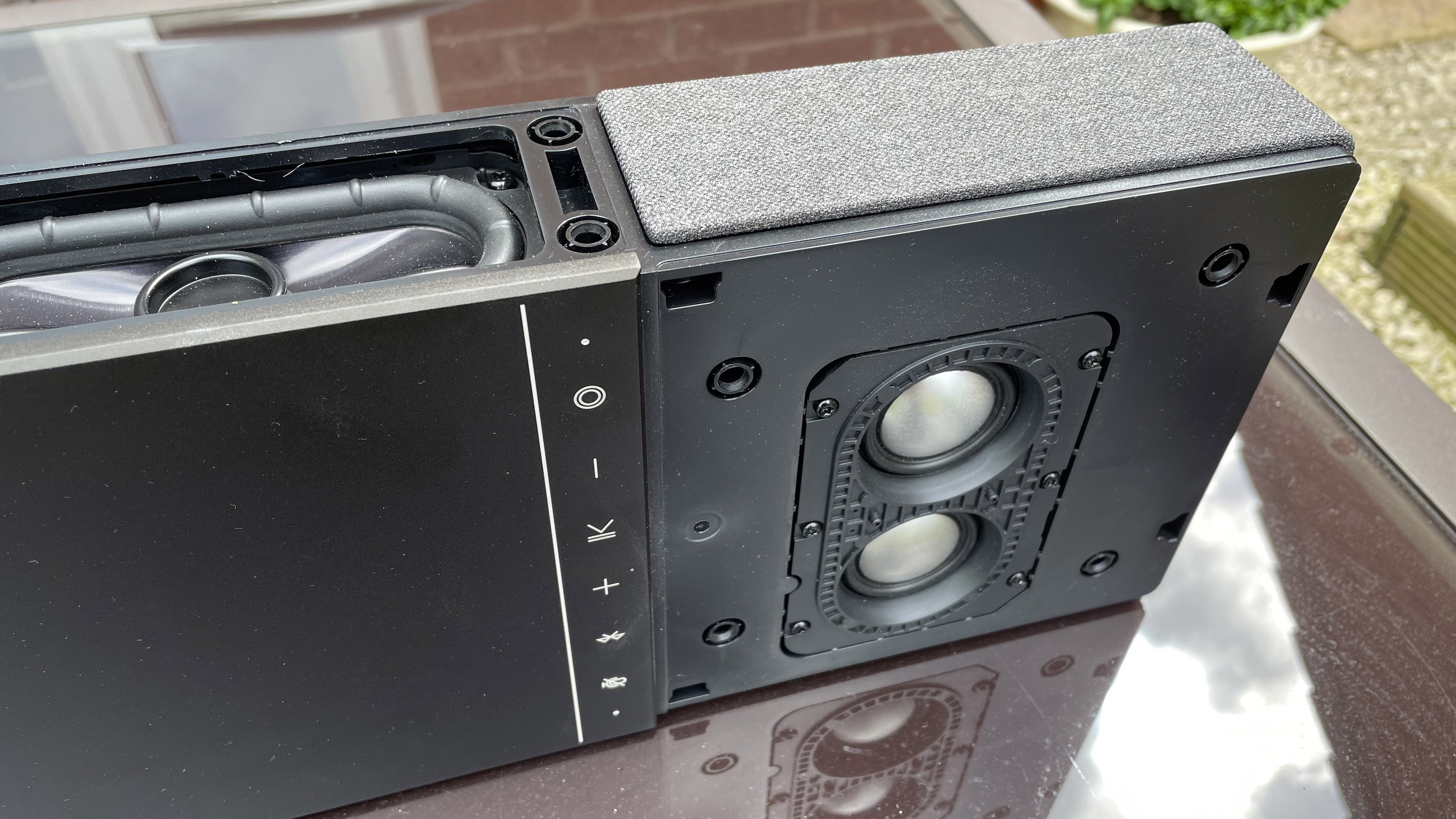
Devialet Dione: Sound quality
While there are inevitably sound limitations associated with its single-box design, if you don’t want the hassle of external subwoofers and rear speakers cluttering up your room, the Devialet Dione lives up to its premium billing.
Right away, for instance, you’re struck by two qualities of the Dione’s sound that set it apart from cheaper single-bar solutions: the scale of the sound, in terms of how far it’s projected from the physical unit, and how much bass there is.
Starting with the scale: left and right separation with Dolby Atmos movie soundtracks is excellent, and joins forces with the ‘beams’ of sound from the ‘rear’ side drivers to create a soundstage that spreads effortlessly right across a small to medium sized room.
I couldn’t honestly say I got any real sense of sound effects coming from behind me, though, but this is true also of pretty much every other single-box soundbar solution. And actually I’d rather a single-unit soundbar focused on delivering a convincing front hemisphere experience than pushing its cohesion too far by trying to create a rear soundstage that would likely sound vague and artificial anyway.
The cohesion of the Dione’s front soundstage is exceptional, in fact. By which I mean that the sound just doesn’t spread out nice and wide, but also creates an appropriate sense of different spaces within its width by accurately placing specific mix effects. None of those placement effects sound unnaturally over-emphasised or out of kilter with the rest of the mix, either.
The sound also projects forward into a room. Not, perhaps, with the sort of pressure and room-filling scope I’ve heard with some high-end rivals, but to a degree that actually feels appropriately matched with the scale and approach of the soundstage’s width.
The Orb centre channel driver, meanwhile, locks dialogue right at the heart of the mix exactly as it should. It delivers dialogue with a clarity and distinction that’s among the best I’ve heard. Just occasionally, however, high-pitched dialogue could be a touch exposed. For the vast majority of the time, though, dialogue delivery is exceptional.
The spherical design of the centre speaker manages to both slightly lift the dialogue vertically, so it feels attached to the onscreen action above the Dione, and spread it out enough to make you forget that every word is coming from a small ball at the heart of a much larger audio setup.
The Dione’s sound is rounded out impressively by good height effect work from the up-firing height drivers. While this doesn’t result in a true sense of sounds coming from right above your head, there’s certainly a convincing and consistent sense of verticality to the sound. This stretches right across the room too, rather than vertical effects just sounding locked to a narrow area directly above the soundbar’s bodywork, and specific effects are located into the resulting wall of sound with enough precision to maintain the Dione’s outstanding sense of clarity.
I should add here that you should definitely run the auto calibration system before you start using the Dione. Out of the box, ambient effects and trebles felt too prominent in the mix; after the Dione’s short calibration process, though, everything sounded much better balanced and rounded.
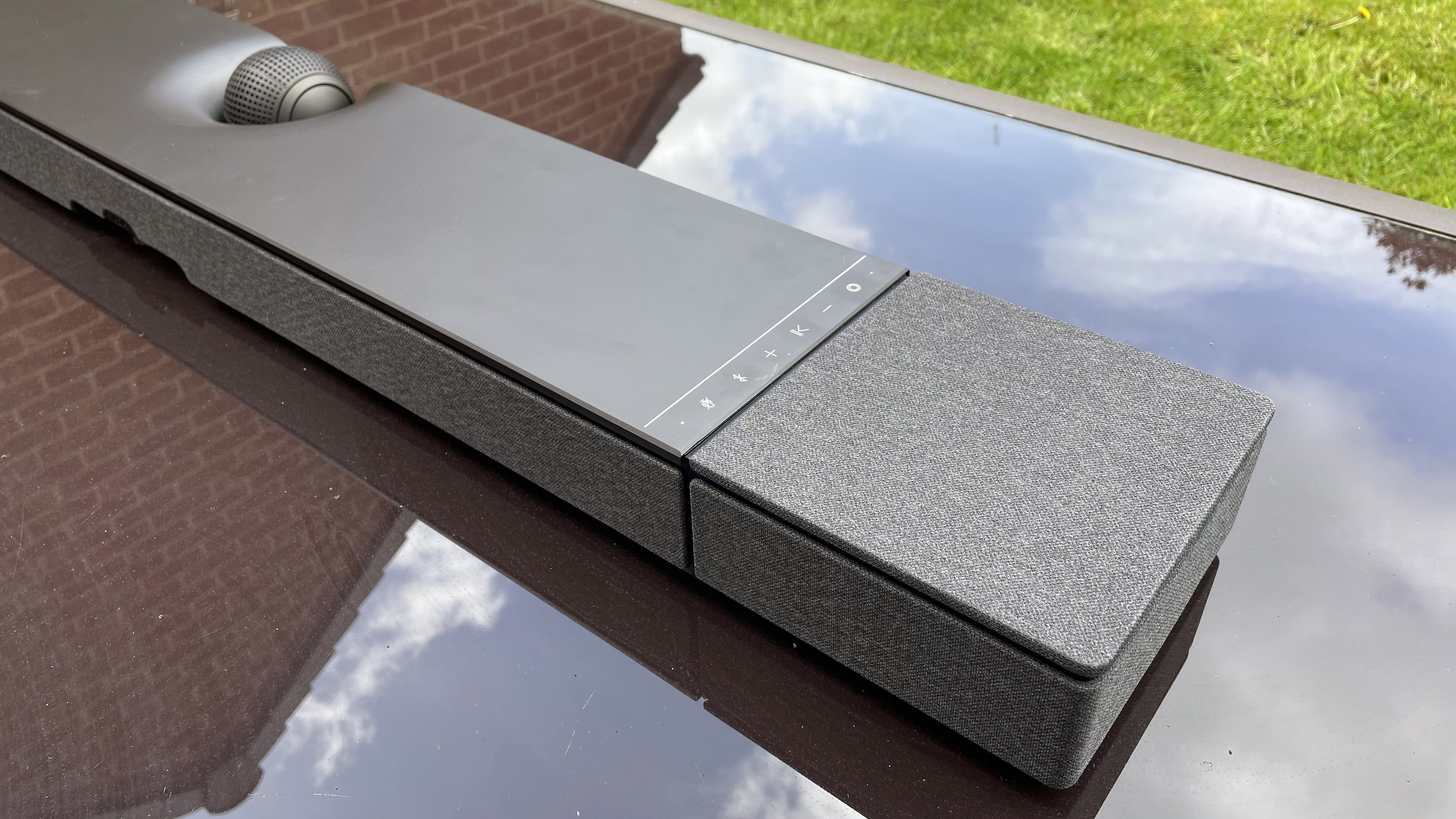
The Dione’s bass performance is remarkable. We got rumbles out of it with famously extreme movie soundtracks that you’d normally only hope to hear from a respectable external compact subwoofer. It isn’t just the weight of the bass that impresses, either. It also escapes the confines of the soundbar almost uncannily, delivering the same sort of non-directional presence associated with external sub solutions.
The bass ties in with the expansive mid-range convincingly, but also never overwhelms any of a sound mix’s more delicate elements. And, crucially, despite the depths the Dione can plumb, it doesn’t succumb to distortions or dropouts even under the most extreme duress. The only issue is that you need to be running the Dione at pretty high volumes before the bass starts to participate as much as a good action movie soundtrack deserves.
There are one or two other small limitations worth mentioning. One to reiterate is that although the Dione’s side-firing speakers are impressive, they don’t create any substantial sense of sound coming from behind you. Though this is something most people looking at such a solution will likely have already factored into their expectations.
High pitched vocals can sound a touch sibilant through the Orb, as can particularly dense string arrangements in a movie score. Hard impact sounds can sound ever-so-slightly polite too.
Moving away from movies to music playback, the Space system for remixing stereo or even mono tracks into 5.1.2 to match the soundbar’s capabilities is a little hit and miss. With relatively stripped back, bass-heavy music it works very well, adding more dynamic range and creating a much larger but still controlled and credible soundstage. Some classical music can benefit from it too, as it creates a more concert hall feel. With more guitar-driven or vocal-heavy fare, though, or music with a very expansive dynamic range, the Space remix can sound a bit fatiguing and forced, and the bass can become a little ragged.
If you find this happening with a particular album, though, you can always switch back to simple stereo playback, which – fittingly given that a soundbar as excellent as this deserves us to finish on a high – the Dione excels at. Pretty much everything that can sound unnatural, tiring or artificial in one of the Dione’s Space modes becomes balanced, authentic and engaging when played as it was meant to be played. Vocals are beautifully managed and staged; power, projection and detailing are all outstanding; and the left/right separation is expansive but also totally cohesive.
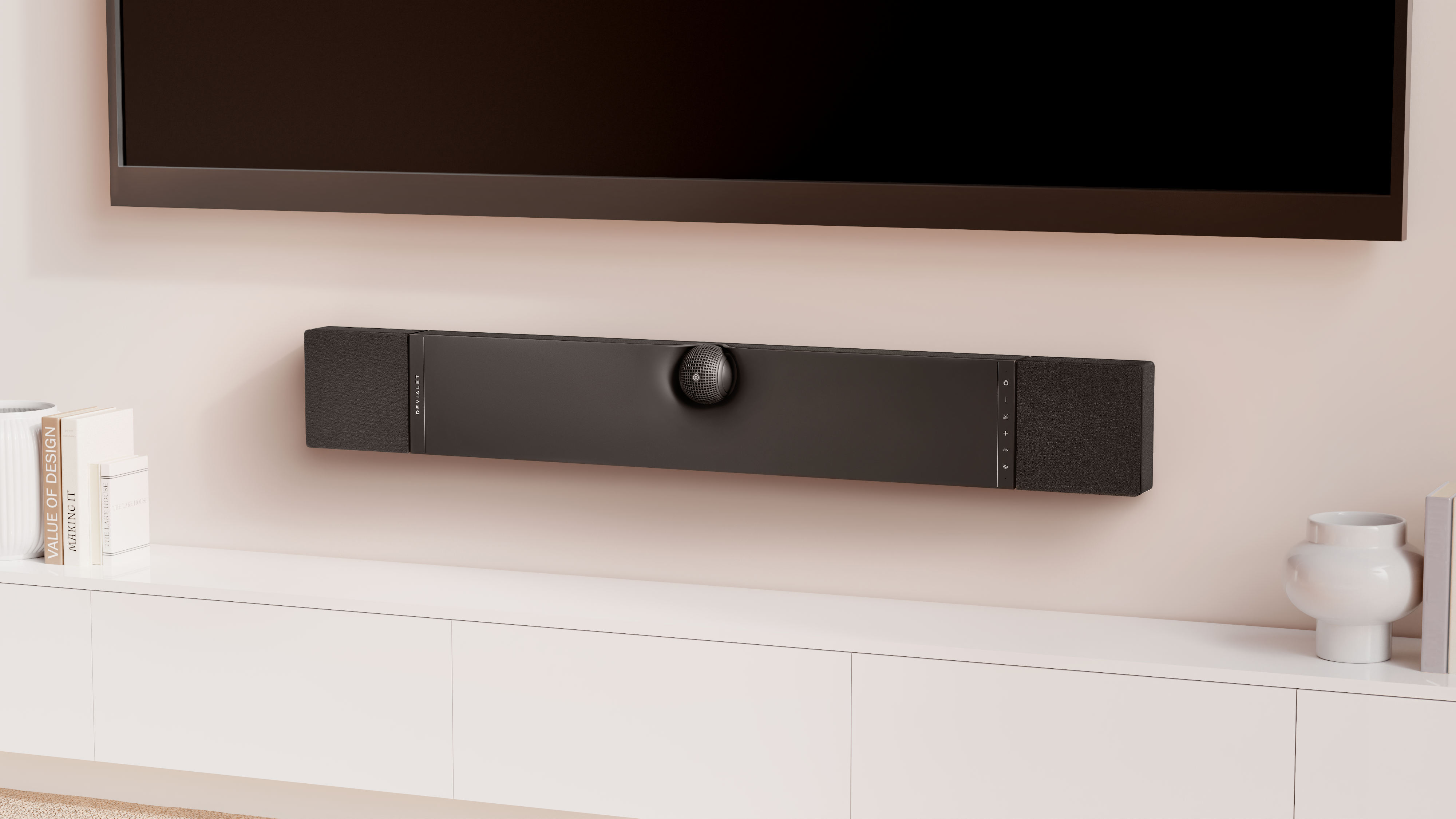
Devialet Dione review: Verdict
The Dione is an exceptional soundbar debut from Devialet, with a distinctive design proving to be an outstanding case of eye-catching form, contributing to outstanding function. In particular, it’s hard to think of any other soundbar that caters so comprehensively for both desktop or wall-mounted positioning, while the spherical, rotating 'Orb' centre speaker helps to create extra clarity and sound projection. The integrated bass performance is remarkable, too.
The Dione isn’t cheap, though, and as with pretty much all single-bar solutions, it doesn’t really deliver any surround sound action. The single-bar solution understandably remains hugely popular, however, and in that market the Dione comfortably rubs shoulders with more established soundbar royalty.
Also consider
Another one-box solution that comes to mind is the massive and (massively impressive) Sennheiser Ambeo. It's no cheaper than the Devialet, however, indeed it's often pricier, but for a full-on frontal soundstage assault there's no better single box solution.
Looking for something more truly surround sound though? Then you'll want to eye-up Samsung's HW-Q990B for its all-immersive quality. It's got a separate sub and other speakers included, so might not be as visually neat for your home setup, but it's sonically unrivalled in 2022's soundbar market.
Sign up to the T3 newsletter for smarter living straight to your inbox
Get all the latest news, reviews, deals and buying guides on gorgeous tech, home and active products from the T3 experts
John Archer has been testing TVs and AV gear for over 25 years, having worked on Home Cinema Choice magazine. He's a contributor to Forbes, TechRadar, Trusted Reviews, Wired and many more places – if you've owned a TV in the last couple of decades, John's probably reviewed it somewhere. He's seen so many hot new technologies come and go, like tears in the rain.
-
 Polar’s new subscription feature lands in the shadow of Garmin’s Connect+ rollout
Polar’s new subscription feature lands in the shadow of Garmin’s Connect+ rolloutPR genius or timing disaster? Polar’s new Fitness Programme adds adaptive training to its ecosystem
By Matt Kollat Published
-
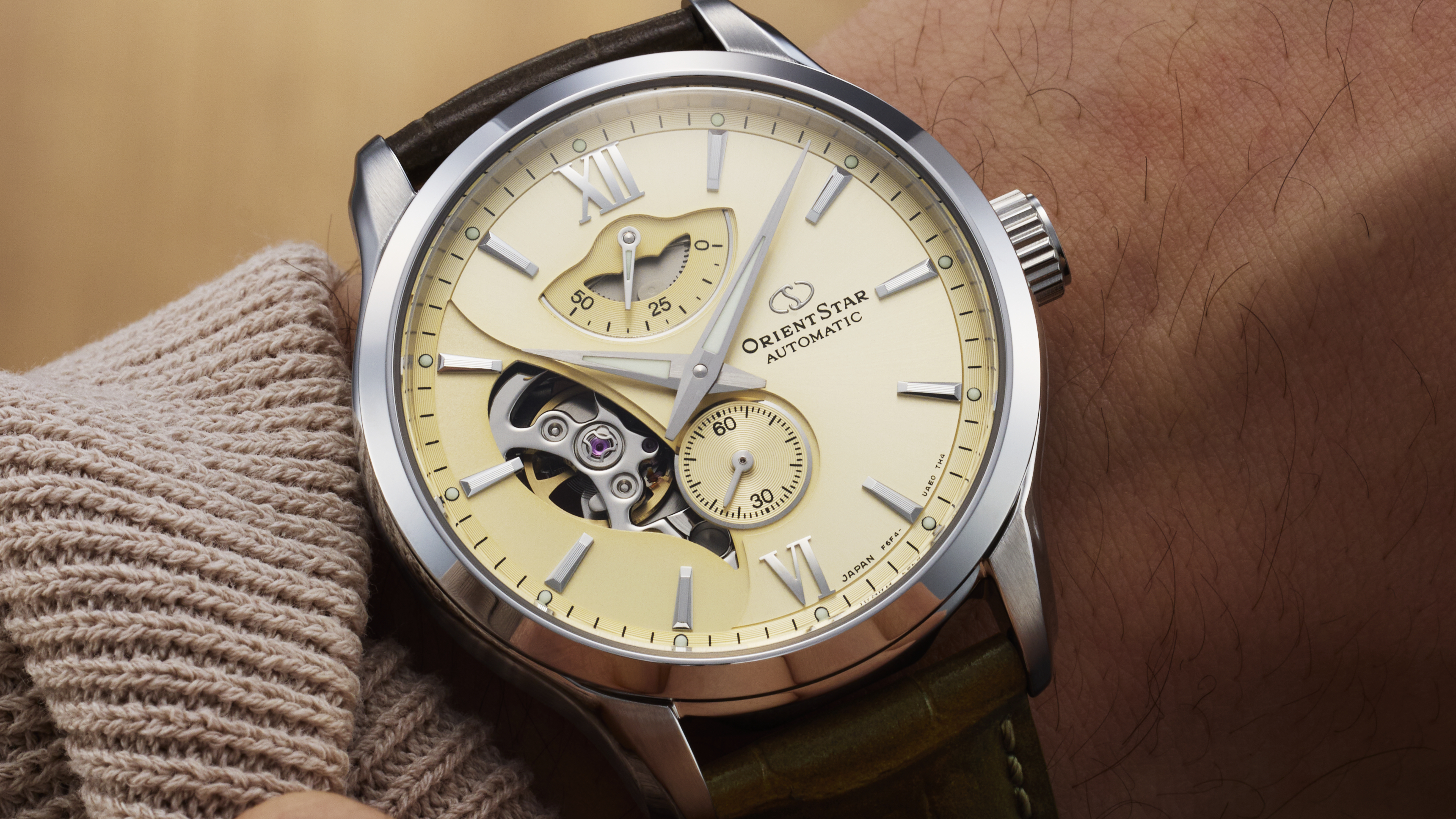 New Orient Star watches offer a glimpse of the magic within
New Orient Star watches offer a glimpse of the magic withinThere are two new skeleton pieces
By Sam Cross Published
-
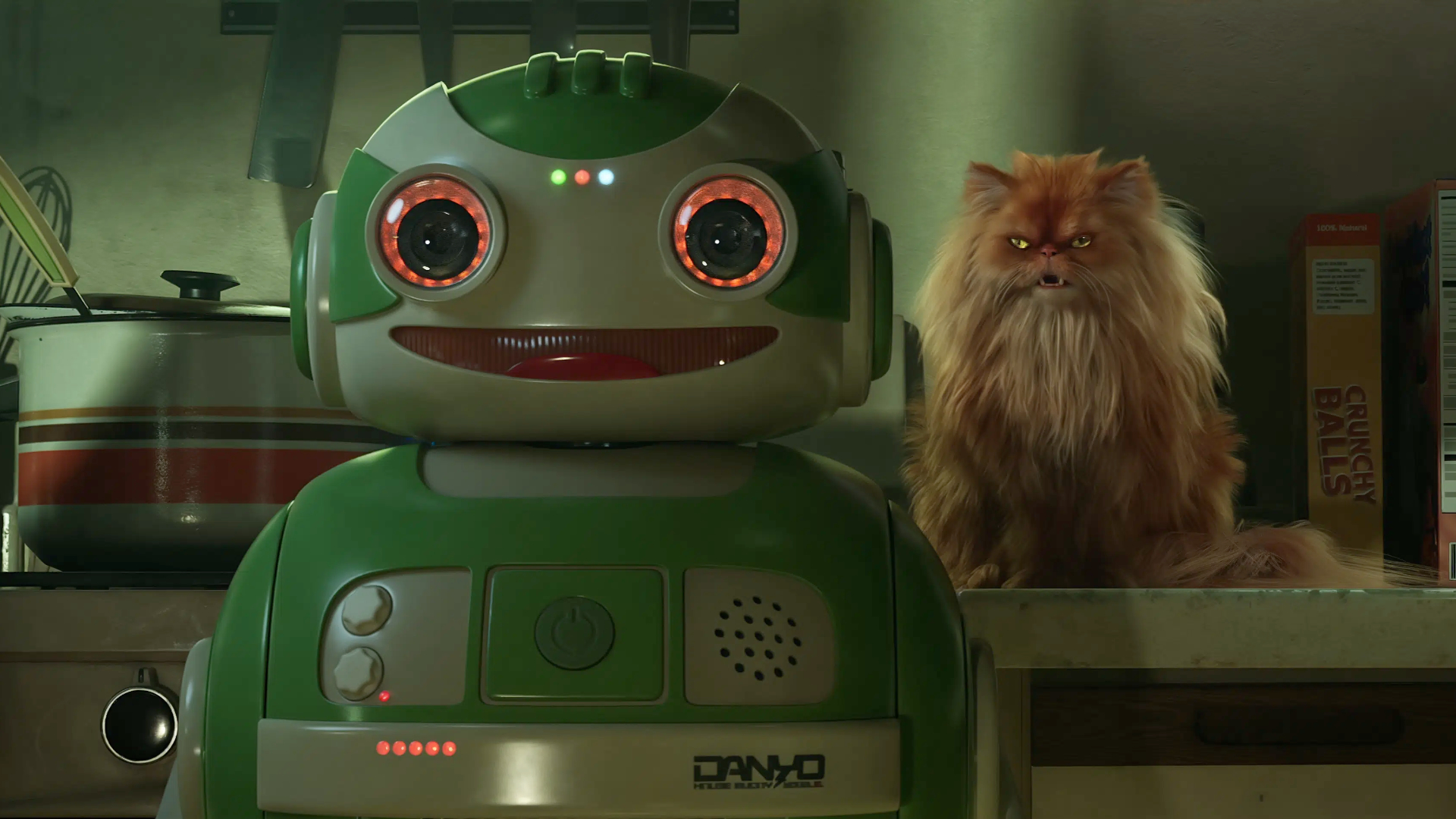 Netflix's most surprising 100%-rated sci-fi series returns with gorgeous trailer
Netflix's most surprising 100%-rated sci-fi series returns with gorgeous trailerLove Death + Robots is back for more
By Max Freeman-Mills Published